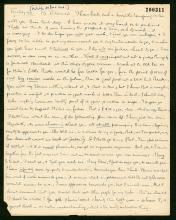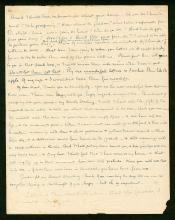BRACERS Record Detail for 19316
To access the original letter, email the Russell Archives.
"Tuesday evg. My Beloved, I have had such a terrible longing to be with you these last days—it has made it very hard to be patient—"
Date is tentative. Colette's letter of 26 June indicates that she will see him that day. Yet at the end of this letter, Russell writes that he is counting the days till they can be together.
There is a literary version, no. 45, containing part of one paragraph from this letter, p. 65, signed "L": document .052392, record 99857.
Letter 22
BR TO CONSTANCE MALLESON, [18 JUNE 1918]
BRACERS 19316. ALS. McMaster
Previous Brixton letter, BRACERS 48706; next letter, BRACERS 48709
Edited by K. Blackwell, A. Bone, N. Griffin and S. Turcon
<Brixton Prison>1
Tuesday evg.2
I have had such a terrible longing to be with you these last days — it has made it very hard to be patient. I hate to think of your having the prospect of being out of work3 — it is worrying. I do do hope you will get work. I feel you are unhappy, and I long to be able to put my arms round you and say tender words to you, and make you feel how much I believe in you. I do not see failure ahead of you. I see success, in one way or in another. I feel it very important not to judge things by a financial standard at this stage of your career. Work at the Old Vic or for Miles’s Little Theatre4 would be far better for you, from the point of view of real big serious work in the future, than a good part at a West End Theatre. You will say I know nothing about it, and that is true; but I know that in everything practice is useful, and practice in good work is better than in bad. I should say, take anything however badly paid if it gives practice and scope. I suppose you won’t have to support Miles in future. That is £400 a year clear — which one can live on. I shall have about the same, if the fellowship plan comes off. I have just been seeing Elizabeth, who was charming about you — not at all patronizing this time — beginning really to appreciate you. She told me, in answer to my inquiry, that, as I suspected, my brother does not want me back at Gordon Sq.5 So I shall go to my flat. I am glad to have it settled — and it is much pleasanter, except as regards expense. And you and I can be together from the first moment I am out — as much as ever you can manage. I long to be out — I need you, and I feel you need me. O my Dear, I feel so near you, so one with you. I have infinitely more sympathy and understanding towards you than I had. I know now what being out of work means to you — it means what imprisonment till the end of the war would mean to me. I was oppressive towards you, but I am not now. And I shan’t demand that you should shut out other people for my sake — tho’ no doubt I shall be cross! You spoke of having learnt charity this last year — so have I, a great deal — or rather understanding, which is the really valuable thing.
Dearest I should love to know more about your doings. Do you see Maurice much?6 Is he prospering? How about the Gordons?7 Was Miles responsible for the child Marie8 was going to have? Who do you see? And how do you pass your days? Are Miles and Basil Gill great friends?9 I want to be able to picture your days. But don’t bother to answer if it bores you.a— Mine of course contain no incident so I have nothing to tell. Next time I am going to return your letters, as it might be risky for me to try to take them out of the prison with me. Please put them with mine to you in that deed box, and I will move them into mine when I come out. Do not let them get lost. They are wonderful letters10 and I value them like the apple of my eye and I wouldn’t lose them for worlds.
My dear Heart, I miss you so dreadfully. You are the most wonderful lover that ever there was. I have been happy with you, happy beyond imagination. The moment of creeping into your arms — my lovely Darling, I wish I had all the gifts of the world to be able to tell you what that moment is to me. And you are in the world all this time and your arms are empty of me — and we have only one life, and the moments pass. When I come out we will go to Ashford, and there will be autumn mornings with dew and white gossamer and yellow leaves against a blue blue sky, and a delicious smell from leaves on the ground — and still evenings with a crisp coolness in the air. And I shall put my arms round you, and kiss your lips till our very souls touch — and O my love I shall feel that I have come to my home and that all my life up to that moment has been only prelude. I love you with all that is in me — if ever there was love in the world, you have love from me.
Goodnight my dearest Darling. Think of me counting the days till we can be together, living in the thought of you, happy — but oh so impatient.
B.
Letter to Miss Wrinch elsewhere.11 Read before forwarding if it would interest you.b
- 1
[document] The letter was edited from the initialled original in BR’s handwriting in the Malleson papers in the Russell Archives. The single sheet of laid paper, ruled on one side, was folded twice.
- 2
[date] “[Probably 25 June 1918]” was added by Colette to BR’s “Tuesday evg.” In the letter BR said he was longing to see Colette and gave no sign that he expected to do so soon. However, Colette’s letter of 26 June 1918 (BRACERS 113136) and a letter from Gladys Rinder of 21 June (BRACERS 79616) indicate that Colette would see him on the 26th, a Wednesday. Only one visit of friends and family was allowed per week, on either Tuesday or Wednesday, and BR indicated in the current letter that he had just seen his sister-in-law, Elizabeth. Moreover, in his letter to Frank Russell of 24–25 June, he told Ottoline he wished the fellowship plan dropped, whereas in the current letter he was still hoping the plan might come off. The letter seems, therefore, to have been written on Tuesday, the 18th of June.
- 3
prospect of being out of work In a letter from Gladys Rinder to BR, 21 June 1918 (BRACERS 79616), Colette (as C.O’N) wrote: “I have two or three jobs under discussion but nothing definite.”
- 4
Miles’s Little Theatre In her letter of 24 June (BRACERS 113135) Colette wrote: “The idea of starting an Experimental Theatre ... is taking shape. Miles would earn a tiny income from it.”
- 5
Gordon Sq. With Frank and Elizabeth’s marriage coming apart and BR tending to sympathize more with Elizabeth than with Frank, Frank was no longer willing to let BR stay at Gordon Sq. when he was released from prison.
- 6
see Maurice much? There was a response of sorts to this in Colette’s letter of 10 July 1918 (BRACERS 113140), in which she indicated that Maurice Elvey had turned up at Brighton and that she had felt at odds with him. Colette had been there with Gladys Rinder in mid-June (BRACERS 2841). She promised BR that she would write “more about it when it is clearer” in her own mind.
- 7
the Gordons? Presumably BR meant to write “the Greenwoods”. In her letter of 18 July Colette told BR that “Miles has been seeing a good deal of the Edwin Greenwoods” (BRACERS 113143). BR had met the Greenwoods; Edwin was a C.O. and also an actor. He corresponded with both Edwin and Georgie Greenwood the year after leaving prison. Edwin Greenwood (1895–1939) became a screenwriter, director, and novelist.
- 8
Marie Colette wrote in a letter of 10 July 1918 (BRACERS 113140), in response to BR’s requests in Letter 28, that Marie Blanche “seems to be vanishing, but I don’t think Miles is specially upset.” On 20 August (BRACERS 113152), she added: “Marie, by the way, has quite vanished. I knew her three whole years before I knew you, we were such friends, and now she’s vanished. Sad.” As for BR’s paternity question, it cannot be determined whether Miles was the father.
- 9
Miles and Basil Gill great friends?Colette had first written of Miles and Basil Gill becoming friends in her letter of 4 June (BRACERS 113134). Basil Gill (1877–1955) was a stage and film actor.
- 10
They are wonderful lettersColette had them typed for her book of her letters to BR (unpublished; in the Russell Archives). She reported to K. Blackwell that “the originals, carelessly stored in Sweden, were by accident destroyed in a fire there” (12 Nov. 1968, BRACERS 121624).
- 11
elsewhere This letter, which is not extant, was placed elsewhere in the “camouflage” book or journal in which Letter 28 was concealed. (BR used the term “camouflage books” in Letter 89.)


